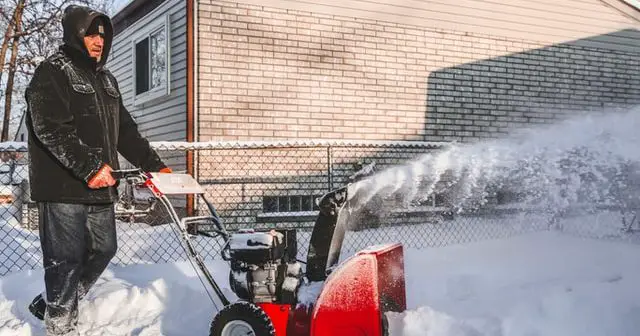When you’re getting ready for winter, one of the things you need to be in its best shape is your snowblower. However, snowblowers are unpredictable, and sometimes they misbehave when you need them the most. The snowblower reacts this way because you haven’t used them for quite a long time. If your snowblower backfires when you start it after a long while, here are a few reasons why it backfires.
This article covers four reasons why snowblower backfires, and they are.
- Bad fuel system
- Degraded spark plug
- Muffler construction
- Slow engine timing
Learning the root cause of the issue is key to solving it. Without further ado, let’s explore the reasons below.
Contents
Bad Fuel System
If you allow fuel to stay for a long time in the fuel tank, it could cause the snowblower to backfire. The high ethanol content in gas can also lead to corrosion of the gas system. Additionally, a clogged carburetor that continually runs lean can cause significant damage. Most people allow it to run lean because they’re not aware you can clean a carburetor without removing it.
To fix this issue, you should ensure you change the gasoline often. Additionally, always leave fuel stable if you’re going to be leaving fuel in the snowblower. You should also avoid gasoline with high alcohol content if you don’t want your snowblower to backfire. Also, clean the carburetor to prevent backfiring of the snowblower. Another solution to your snowblower backfiring is to switch to an electric model to avoid fuel trouble.
Spark Plug Degradation
If carbon builds up in your snowblower, there’s also a high chance of your snowblower backfiring. Spark plug degradation takes place over time and can then cause an issue with the ignition. In such cases, you either have an improper ignition, or you get none. Therefore, the engine responds in a like manner, and the snowblower backfires.
To fix these issues, you should remove fuel from the spark plug hole if there’s any in there. Also, if it’s out of its position, ensure you correct the gap. Sometimes, the ideal course of action is simply replacing the spark plug.
Poor Muffler Construction
There are occasions when the issue is simply the muffler construction. If the muffler isn’t effective, the device’s air control will be insufficient. Due to the muffler’s poor construction, air will distribute around and cause the temperatures to increase. The air proportion will also clog up the system and could lead to engine problems.
To solve this issue, change the muffler to a better design. Additionally, this action guarantees improved air control. Another option would be purchasing a new snowblower with excellent muffler construction. This action ensures you don’t have to worry about poor performance.
Slow Engine Timing
If the snowblower’s ignition cycle doesn’t start properly, it could cause the snowblower to backfire. This result happens when unburnt fuel accumulates in the snowblower. A delayed engine time causes this accumulation to take place before the engine valve fully opens. The ideal solution involves maintaining the electric system. Also, maintain the speed to ensure correct and consistent engine timing.
In one of our previous articles, we shared a few tips on how you can get your snowblower to start even if it has been sitting for a very long time.
- How to Get Potatoes to Sprout Eyes: Detailed Growing Guide with 3 Options - July 31, 2023
- Weight of a Medium Potato: Revealed in Detailed Guide - July 29, 2023
- Maris Piper Potatoes: 9 Substitutes You Should Know About - July 27, 2023
Hello! I’m Jessica Zander, a garden coach and consultant based in the Boston area (zone 6b), offering virtual consultations across the country and Canada.
I’ve been passionate about gardening since the early 1990s, and in 2022, I launched You Can Do It Gardening to empower individuals to feel more confident in their gardening endeavors.
Following a 30-year career in nonprofit finance and operations, I transitioned out of that field in mid-June of 2023 due to the growing demand for coaching services. Interestingly, my years of presenting financial statements to boards and finance committees proved to be valuable experience for teaching people about gardening! I enjoy sharing skills, providing guidance and suggestions, and collaborating efficiently with clients to make significant improvements to their outdoor spaces, both small and large. I also regularly teach at the Arlington Continuing Education and Cambridge Adult Education.
My approach is direct and practical, akin to Mary Poppins, but tailored to your garden. Clients find satisfaction in saving money and taking pride in their own gardening achievements.


Add comment